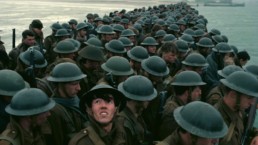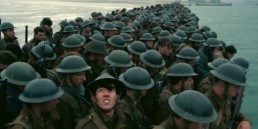‘Dunkirk’ Review: An Epic Achievement Designed for the Big Screen
Christopher Nolan's latest is stunning and breathtaking both in scale and artistry.
Film director extraordinaire Christopher Nolan has cemented himself as one of the few directors whose name alone not only draws audiences to see his films as fast as they can, but on the biggest screen that they can. The undeniable legacy of his entire filmography, including “The Dark Knight” trilogy and “Inception,” has been immortalized in pop culture and for all of the right reasons: he makes great, expansive movies on the largest canvases possible.
Because of this, it’s likely that by the time of publishing, you may have already seen “Dunkirk,” his latest film (in theaters everywhere now). The short answer is that “Dunkirk” is a must see experience, as much as all his prior entries are. But if Nolan’s name alone isn’t a draw, there’s plenty more to get excited about in this film.
Taking place within the World War II Battle of Dunkirk, the film depicts three intersecting perspectives related to a massive evacuation of Allied soldiers (primarily British) from the French coast of the English Channel. From the air, from the sea, and from the beach, we witness three contrasting vantage points in this massive conflict. Everything comes from the level of the soldiers, giving a grounded feeling of immediacy to the entire situation. There are no flashbacks or backstories, everything is in-the-moment-immersion into the conflict at hand. Each facet of this triptych is equally engaging, and watching them intersect is cinema at its finest.
Nolan has never done a war film before, nor a film based on true events but manages to apply some of his signature themes here still. A primary theme in “Dunkirk” is time, and specifically, the manipulation of it. Each of the three stories takes place over different speeds of real time that we’re told of at each of their beginning’s. From each perspective, the tension lasts a different length (depending on their position), and without saying too much, Nolan addresses this head on.
While many films are re-formatted for IMAX as a way to fill the premium space, there is truly no other filmmaker than Nolan working today who has a mastery of how to fill such an epic canvas.
Movies themselves are a manipulation of time: they can take place in under 90 minutes or across decades, as even a single cut can move us millenniums (most famously in “2001: A Space Odyssey”). Nolan applies this exploration of moving time into a battle where time and escape were the most important driving forces on everyone’s minds, making him a perfect thematic match for “Dunkirk.” I can’t think of another war movie before this that chooses to display a historical event in non-chronological order. This is just one of many ways in which the film stands out as unlike any war film I’ve ever seen before.
Much can be said about the experience of seeing this film in IMAX. The genuine IMAX screen at Universal Citywalk is where I was able to experience this film and it did not disappoint, as the visuals projected onto such a massive canvas are utterly breathtaking. Shots that would normally feel like conventional establishing shots play as jaw-dropping visuals on a screen so large you can’t see from top to bottom. Indeed, while many films are re-formatted for IMAX as a way to fill the premium space, there is truly no other filmmaker than Nolan working today who has a mastery of how to fill such an epic canvas. Many other films may market themselves as being needed to be seen on a big screen, but “Dunkirk” is one of the few that truly lives up to that promise.
At a lean 106 minutes in running time (his shortest by a margin, excluding his first feature film, “Following”), there is not a single wasted moment in “Dunkirk.” It’s a captivating journey made unforgettable by how uniquely it’s told. It has been a great summer for independent film, but “Dunkirk” is a reason to believe in the power of a great blockbuster when made by a great filmmaker. It’s a great continuation of Christopher Nolan’s legendary filmography, and easily one of the best films of the year.
106 minutes. “Dunkirk” is rated PG-13 for intense war experience and some language. Now playing in theaters everywhere.
H. Nelson Tracey
Nelson is a film director and editor from Denver based in Los Angeles. In addition to writing for Cinemacy, he has worked on multiple high profile documentaries and curates the YouTube channel "Hint of Film." You can check out more of his work at his website, hnelsontracey.com


